
Belgium and probability in the nineteenth century: The case of Paul Mansion
Laurent Mazliak
Local Government Finance from One Shock to the Next: A Geography of Crises
Cournot study published in Les Cahiers de recherche of the Caisse des DépôtsAuthor: Jean-Philippe Touffut (economist, Director of the Cournot Centre)
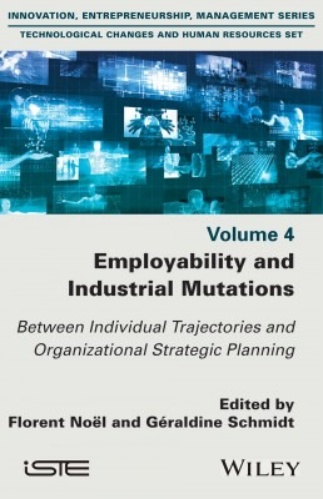
- Employability and Public Policy: A Century-long Learning Process and Unfinished Process
- Introduction to Part 1. Towards a General Theory of Employability
in Florent Noël and Géraldine Schmidt (eds) Employability and Industrial MutationsBernard Gazier.

Macroéconomie et Histoire : Du grand écart à une nouvelle alliance
[Macroeconomics and History: From the Great Divide to a New Alliance]
Robert Boyer

The Splendors and Miseries of Martingales: Their History from the Casino to Mathematics
Laurent Mazliak et Glenn Shafer.
Une discipline sans réflexivité peut-elle être une science ? Épistémologie de l'économie
Robert Boyer.
Mathematical Communities in the Reconstruction After the Great War 1918–1928: Trajectories and Institutions
Laurant Mazliak and Rossana Tazzioli (eds).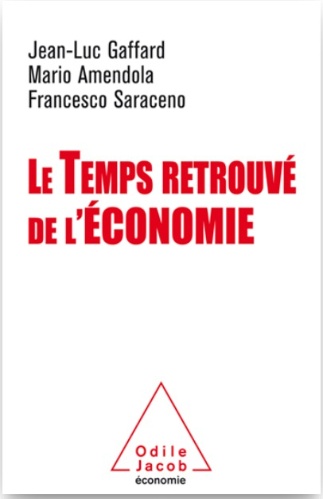
Le temps retrouvé de l'économie
Jean-Luc Gaffard, Mario Amendola and Francesco Saraceno.
Afterword: Conditions for a new social dialogue in Europe
in Semenza R. and Pichault F. (eds), The Challenges of Self-Employment in Europe. Status, Social Protection and Collective RepresentationBernard Gazier.


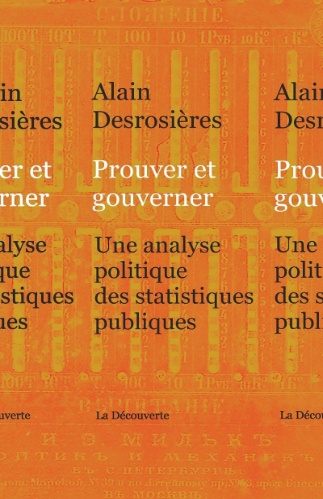
To Prove and To Govern: A Policy Analysis of Government Statistics
Alain Desrosières.
What’s Right with Macroeconomics?
Contributors: Wendy Carlin, Jean-Bernard Chatelain, Giancarlo Corsetti, Giovanni Dosi, Robert J. Gordon, Paul De Grauwe, Xavier Ragot, Xavier Timbeau, Volker WielandEdited by Robert M. Solow and Jean-Philippe
Touffut
Edward Elgar 2012
Order the Book
Global crises are very rare events. After the Great Depression and the Great Stagflation, new
macroeconomic paradigms associated with a new policy regime emerged. This book addresses how some
macroeconomic ideas have failed and examines which theories researchers should preserve and develop.
It questions how the field of economics – still reeling from the global financial crisis initiated
in the summer of 2007 – will respond.
The contributors, nine highly-renowned macroeconomists, highlight the virtues of eclectic
macroeconomics over an authoritarian normative approach. They illustrate that macroeconomic
reasoning can still be a useful tool for carrying out practical policy analysis. As for emerging
research programmes, their wide-ranging chapters remind us that there are positive approaches to and
reasons to believe in old-fashioned macroeconomics.
View the contributors’ presentations given at the Cournot Centre’s conference, What’s
Right with Macroeconomics?, held 2-3 December 2010.
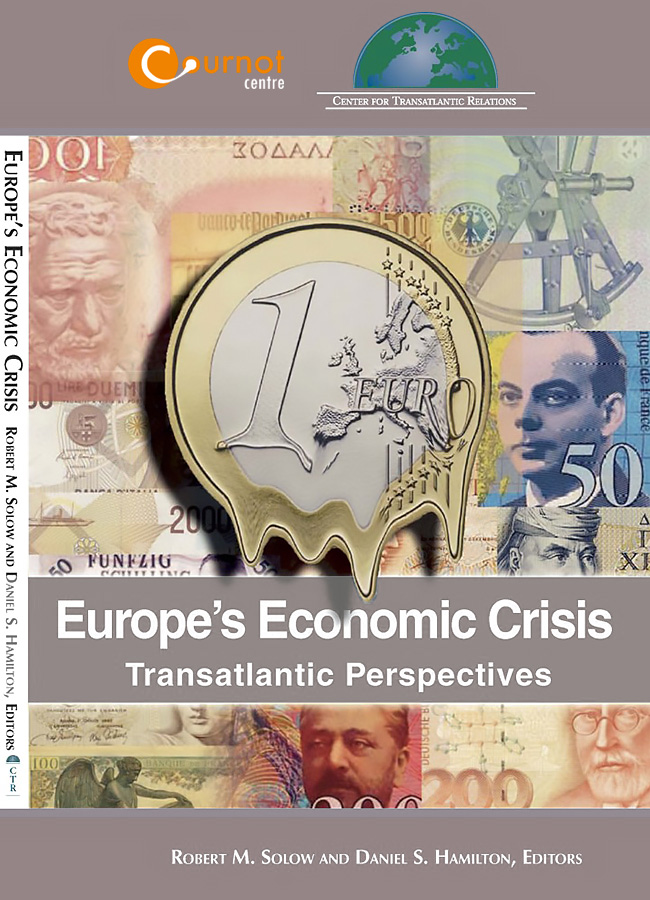
Europe’s Economic Crisis: Transatlantic Perspectives
Contributors: Martin Neil Baily, David Calleo, John Gabriel Goddard, Daniel S. Hamilton, Hans-Helmut Kotz, Natalie McGarry and Xavier RagotA joint project with the Center for Transatlantic Relations, Johns
Hopkins University – SAIS
Edited by Robert M. Solow and Daniel S. Hamilton
Center for Transatlantic Relations, Johns Hopkins University, 2011
When the euro was introduced, it was heralded as the symbol of a unified Europe. Not enough
consideration was given at the time, however, to how member economies could adjust to differences in
economic performance or how to manage debt crises. Today, amidst a broader North Atlantic financial
and economic crisis, the eurozone is in turmoil, beset by stresses and strains that could challenge
Europe’s very construction.
How should eurozone countries tackle their current crisis? How did it come about, and how may it be
resolved? What does it mean for Europe’s historic experiment in political and economic integration?
Will the eurozone crisis be remembered as the moment when the EU finally cracked? Or as the spur to
a more integrated and competitive Union?
The Center for Transatlantic Relations and the Cournot Centre asked the authors in this timely
volume to address these questions. Their varying perspectives are invaluable to anyone seeking to
understand the roots of Europe’s economic crisis and how it may affect Europe’s future.
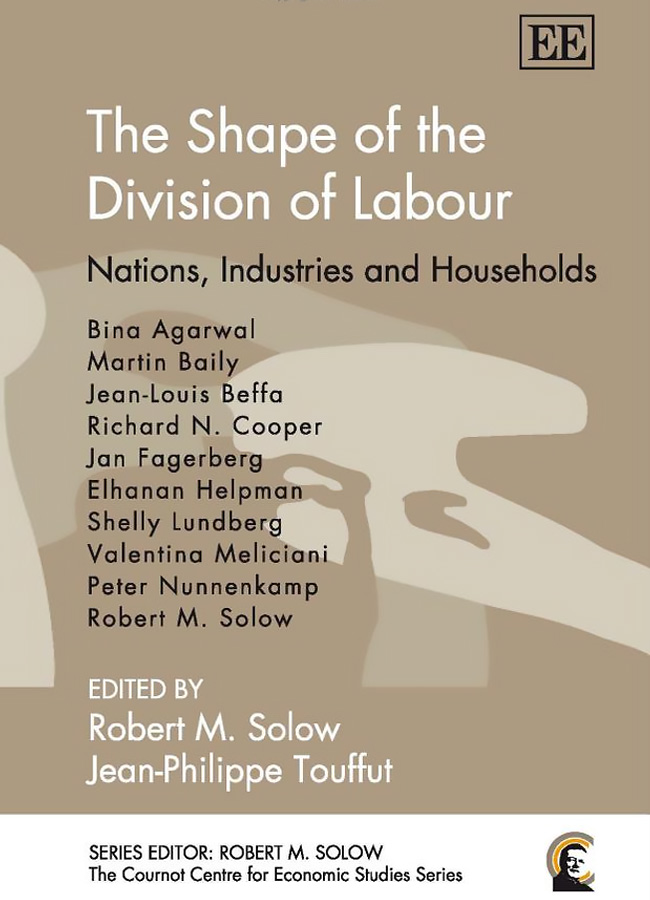
The Shape of the Division of Labour: Nations, Industries and Households
Contributors: Bina Agarwal, Martin Baily, Jean-Louis Beffa, Richard N. Cooper, Jan Fagerberg, Elhanan Helpman, Shelly Lundberg, Valentina Meliciani, Peter NunnenkampEdited by Robert M. Solow and Jean-Philippe Touffut
Edward Elgar 2010
Order the Book
This book is unique in its broad coverage of the concept of division of labour. The variety of
contributions highlight its shape, showing that it is not just limited to the old notions of the
degree of the division of labour among productive units, along the lines of Adam Smith, or the
degree of specialization amongst countries, along the lines of David Ricardo. Through different
lenses, the authors present a panoramic and detailed view of contemporary analyses, including
not only gender, but also assets, sectors and nations. The book edited by Robert Solow and
Jean-Philippe Touffut therefore provides a refreshing new vision on one of the oldest concepts
popular in economic analyses.
- Luc Soete, Professor of International Economic Relations, Maastricht University and
Director of UNU-MERIT
How is work divided up in the household, within an industry, a nation or between continents? What
are the dynamics of the division of labour? The wide-ranging contributions to this book explore
these questions from technological, capital and political perspectives. They include in-depth
studies of gender, the firm, countries’ economic specializations, ICTs, foreign direct investment
and agriculture. The ten distinguished contributors – scholars, economists and practitioners – take
stock of the shape of the division of labour and provide useful policy recommendations.
View the contributors’ presentations given at the Cournot Centre’s conference, The New
International Division of Labour, held 12-13 November 2009.

Changing Climate, Changing Economy
Contributors: Michel Armatte, Jean-Pierre Dupuy, Olivier Godard, Inge Kaul, Thomas Schelling, Robert Solow, Nicholas Stern, Thomas Sterner and Martin WeitzmanEdited by Jean-Philippe Touffut
Edward Elgar 2009
Order the Book
The book launches took place in Washington, D.C. on 3 December and in Copenhagen on 8 December
2009.
This volume brings a remarkable variety of viewpoints on appropriate policy to meet the threats
brought on by man-made climate change. Not only economic theory but broader political and
methodological perspectives are brought to bear by an authoritative set of authors, in what is
certainly a significant contribution to the debate.
– Kenneth J. Arrow, Stanford University
How did climate change become an economic issue? Why is economic discourse so influential on the
public policy of climate change? How can it best contribute to the scientific and public debates?
Eight eminent scholars explain in this book both how economics has changed environmental
understanding and how the study of climate change has modified the economy.
Changing Climate, Changing Economy will interest researchers and students in a variety of fields
including environmental policy economics, ecological economics, public policy and the environment as
well as environmental ethics. Climatologists, environmentalists, public policy advisers and analysts
will also find this book invaluable.
View the contributors’ presentations given at the Cournot Centre’s conference, The
Economic Cost of Climate Change, held 18-19 December 2008.

Does Company Ownership Matter?
Contributors: Jean-Louis Beffa, Margaret Blair, Wendy Carlin, Christophe Clerc, Simon Deakin, Jean-Paul Fitoussi, Donatella Gatti, Gregory Jackson, Xavier Ragot, Antoine Rebérioux, Lorenzo Sacconi and Robert SolowEdited by Jean-Philippe Touffut
Edward Elgar 2009
Order the Book
The 2008 financial crisis has caused the validity of theshareholder-oriented model to be
scrutinized. Was the model right? Was it just that the regulations were inadequate, or was it
the financiers’ greed? Should we not have earnestly searched for another model? Originally
presented a year before the crisis, thepapers in this volume did more than anticipate such
debate. This book provides excellent food for thought for anyone interested inhow to reconstruct
the corporate economy.
– Masahiko Aoki, Stanford University
Do modes of management depend on company ownership? Does macroeconomic performance rely on
shareholder value? The contributions collected in this book explore these questions from economic,
historical and legal perspectives. They examine company ownership through the study of national
institutions, with particular focus on North America and Europe. The 12 economic and legal
specialists of this volume seek to explain why firms organized along the shareholder model have not
outperformed other forms of ownership. Answers lie in the historical and institutional background of
each country.
This book will appeal to a wide-ranging audience encompassing researchers, students and academics in
the fields of corporate governance, company law, finance and organization theory.
The first versions of these texts were presented at the Cournot Centre’s conference,
Does Company Ownership Matter?, held 29-30 November 2007.

Central Banks as Economic Institutions
Contributors: Patrick Artus, Alan Blinder, Willem Buiter, Barry Eichengreen, Benjamin Friedman, Carl-Ludwig Holtfrerich, Gerhard Illing, Otmar Issing, Takatoshi Ito, Stephen Morris, André Orléan, Nouriel Roubini and Robert SolowEdited by Jean-Philippe Touffut
Edward Elgar 2008
Order the Book
Theories and practices in central banking and monetary policyhave changed radically over recent
decades with independenceand inflation targeting as the new keywords. This book offers
interesting perspectives on the drivers of this developmentand its implication. It addresses
contemporary questions onaccountability, transparency and objectives for monetary policy as well
as current policy problems related to globalization andfinancial imbalances. The book is
topical, insightful and well written – a must for everybody with an interest in central
bankingand monetary policy.
– Torben M. Andersen, University of Aarhu
The number of central banks in the world is approaching 180, a tenfold increase since the beginning
of the twentieth century. What lies behind the spread of this economic institution? What underlying
process has brought central banks to hold such a key role in economic life today? This book examines
from a transatlantic perspective how the central bank has become the bank of banks. Thirteen
distinguished economists and central bankers have been brought together to evaluate how central
banks work, arrive at their policies, choose their instruments and gauge their success in managing
economies, both in times of crisis and periods of growth.
Central banks have gained greater independence from government control over the last 20 years. This
widespread trend throws up new questions regarding the foundations, prerogatives and future of this
economic institution. This book provides a better understanding of the current financial crisis
through the in-depth study of the central bank. Researchers in the fields of monetary theory,
monetary policy and central banking will find this volume of great interest. It will also appeal to
students of economics, political economy, banking and finance, as well as economists, academics, and
public policy advisers and analysts.
The first versions of these texts were presented at the Cournot Centre’s conference,
Central Banks as Economic Institutions, held 30 November and 1 December
2006.

Augustin Cournot: Modelling Economics
Contributors: Robert J. Aumann, Alain Desrosières, Jean Magnan de Bornier, Thierry Martin, Glenn Shafer, Robert M. Solow and Bernard WalliserEdited by Jean-Philippe Touffut
Edward Elgar 2007
Order the Book
This rich and fascinating collection of essays helps enormously to establish the reputation of
Augustin Cournot as a diverse and powerful thinker, whose numerous contributions range far
beyond his widely acknowledged model of oligopoly. Cournot is revealed not merely as a
mathematician, but one who was engaged in philosophical debates concerning epistemology and the
nature of science. Anyone with the preconception that the development of modern economics was
confined to the Anglophone world – from Smith through Marshall to the Nobel Laureates of today –
will be amazed by the details of Cournot’s contribution revealed here.
– Geoffrey M. Hodgson, University of Hertfordshire
“If Augustin Cournot had still been alive, he could have won the Nobel Memorial Prize in Economics
on at least three different occasions”, exclaimed Nobel Laureate Robert Aumann during the 2005
Cournot Centre conference. From his earliest publications, Cournot broke from tradition with his
predecessors in applying mathematical modelling to the social sphere. Consequently, he was the first
to affirm the mathematization of social phenomena as an essential principle. The fecundity of
Cournot’s works stems not only from this departure, but also from a richness that irrigated the
social sciences of the twentieth century.
In this collection, the contributors – including two Nobel Laureates in economics – highlight
Cournot’s profound innovativeness and continued relevance in the areas of industrial economics,
mathematical economics, market competition, game theory and epistemology of probability and
statistics. Each of the seven authors reminds us of the force and modernity of Cournot’s thought as
a mathematician, historian of the sciences, philosopher and, not least, as an economist. Combining
an epistemological perspective with a theoretical one, this book will be of great interest to
researchers and students in the fields of economics, the history of economic thought, and
epistemology.
The first versions of these texts were presented at the Cournot Centre’s conference,
Augustin Cournot, Economic Models and Rationality, held 1-2 December 2005.

Advancing Public Goods
Contributors: Patrick Artus, Avner Ben-Ner, Bernard Gazier, Xavier Greffe, Claude Henry, Philippe Herzog, Inge Kaul, Joseph Stiglitz and Jean-Philippe TouffutEdited by Jean-Philippe Touffut
Edward Elgar 2006
Order the Book
This is a timely and thought-provoking book which brings the discussion of public goods to
confront the contemporary world economy where such goods have often a global nature and require
super-national provision and control.
– Giovanni Dosi, Sant’Anna School of Advanced Studies
In this wide-ranging selection of papers, distinguished economists, public policy advisers and
political theorists contribute to the debate on public goods. The studies cover topics in the
conceptualization, classification and stratification of public goods.
Also examined are public institutional design, global economic institutions and partnership
typologies. Individual papers address the financing, regulatory, organizational and legal aspects
relating to services of general interest in Europe. The dynamics of global public good production,
including monopolies, patents, scientific uncertainty and market failures, are discussed. Empirical
research on the state, profit and non-profit sectors is presented. Providing numerous examples of
specific public goods, the contributions also highlight the impact of macroeconomic policies on
provision. The book presents a broad diversity of new approaches to global public goods within the
framework of mixed economies, beyond the standard economic analysis of public services. Academics,
researchers and policymakers in the area of global public goods and services will find this volume
of great interest.
The first versions of these texts were presented at the Cournot Centre’s conference,
Public Sector, Private Sector: New National and International Frontiers, held
2-3 October 2003.
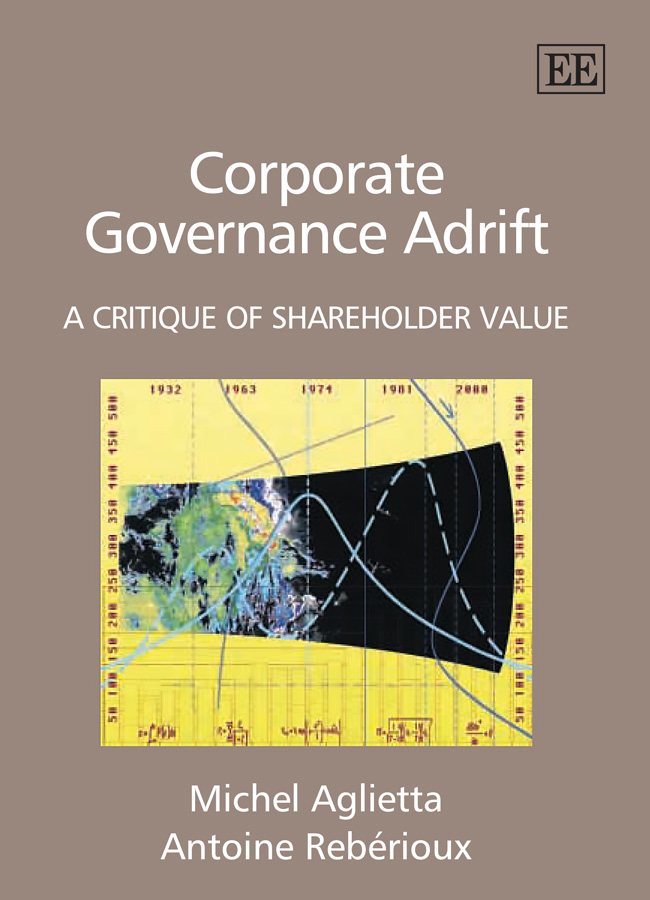
Corporate Governance Adrift: A Critique of Shareholder Value
Michel Aglietta and Antoine RebériouxEdward Elgar 2005
Order the Book
Corporate Governance Adrift is a challenging book… the authors have succeeded in creating a work
that is consistently fascinating and an argument that is lucid and gripping without ever
compromising its intellectual weight.
– Manifest
Recent corporate governance scandals have brought to the fore the inherent contradictions of a
capitalism dominated by financial markets. This challenging book by Michel Aglietta and Antoine
Rebérioux argues that capitalism’s basic premise – that companies must be managed in the sole
interest of their shareholders – is incongruent with the current environment of liquid markets,
profit-hungry investors and chronic financial instability.
The authors advocate rather that a company should be managed as an institution where common
objectives are developed for all stakeholders, and that this democratic principle should be extended
to the management of collective savings to reduce macro-financial instability. These two conditions,
they contend, could make contemporary capitalism a vehicle for social progress.
Corporate Governance Adrift has been translated and published in Spanish and is forthcoming
in Portuguese.
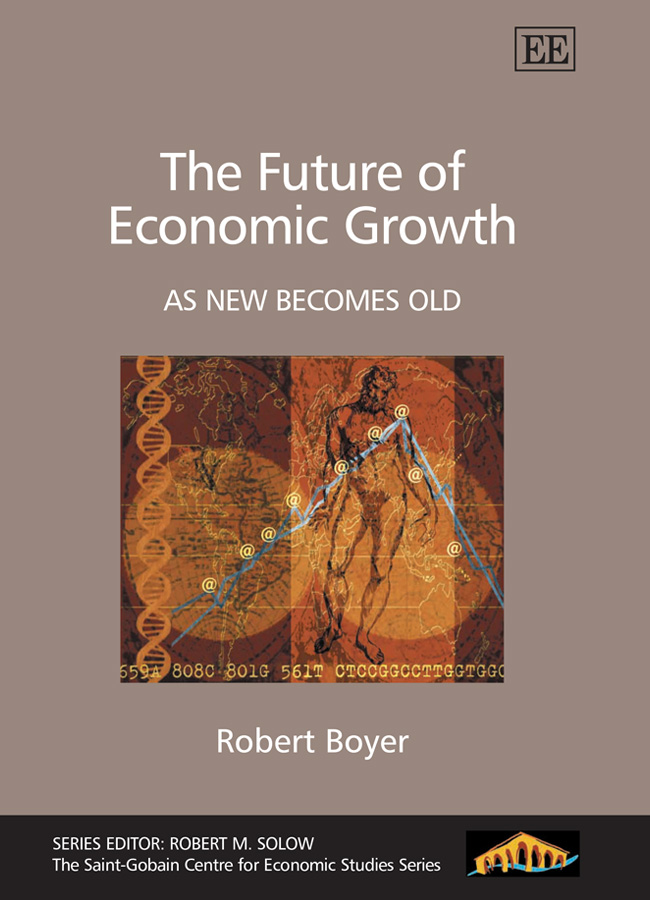
The Future of Economic Growth: As New Becomes Old
Robert BoyerEdward Elgar 2004
Order the Book
How significant was the internet boom and bust? Robert Boyer brings significant and fresh
insight to efforts to situate the meaning of the digital transformation through which we are
living. With analytic discipline and historical perspective, Boyer provides an important
interpretation that will be valuable to scholar and teacher, those just curious about the
internet development and those who lived through it.
– John Zysman, University of California, Berkeley
In this book, Robert Boyer follows the origins, course a broad spectrum of issues ranging from
labour markets to corporate governance. Growth paths within the OECD are also assessed, with
particular emphasis on contrasts between US and European models. The book seeks to identify those
institutional factors, taking into account different national trajectories, which might serve to
promote economic growth in Europe. and collapse of the “new economy” and proposes a new
interpretation of US dynamism during the 1990s.
He argues that the diffusion of information and communication technologies is only part of a story
that also requires understanding of the transformation of the financial system, the reorganization
of the management of firms and the emergence of a new policy mix. The book includes a long-term
retrospective analysis of technological innovation, and an international comparison of O.E.C.D.
countries delivers an unconventional and critical assessment of the hope and the hype of the “new
economy”.
The Future of Economic Growth has been translated and published in Japanese.
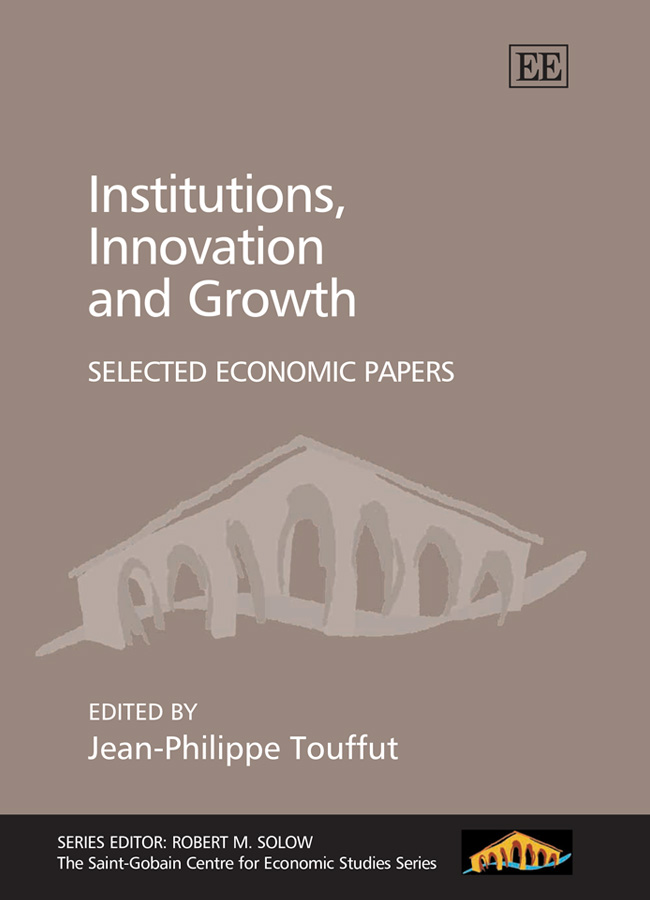
Institutions, Innovation and Growth: Selected Economic Papers
Contributors: Philippe Aghion, Bruno Amable with Pascal Petit, Timothy Bresnahan, Paul A. David, David Marsden, AnnaLee Saxenian, Günther Schmid, Robert M. Solow, Wolfgang Streeck and Jean-Philippe TouffutEdited by Jean-Philippe Touffut
Edward Elgar 2003
Order the Book
While interest in innovation and economic growth has exploded in the economics literature in
recent years, the role of institutions has been largely overlooked. With publication of this
book, Jean-Philippe Touffut brings together a leading group of international scholars to provide
a path-breaking rigorous analysis of the links between institutions, innovative activity and
economic growth. The conclusions from the volume are unequivocal – not only do institutions
matter in shaping economic growth, but also their impact can be understood in a systematic and
predictable manner.
- David B. Audretsch, Indiana University
This book contains informed and informing contributions by noted scholars on innovation and
growth – surely the most critical topics for economic welfare in the long run. The essays will
be most satisfying to students and others seeking greater relevance in the analytic materials of
our literature.
- William J. Baumol, New York University, US and Princeton
University
The first book in this important new series, under the general editorship of Nobel Laureate Robert
Solow, Institutions, Innovation and Growth assembles a stellar cast of international contributors.
Leading economists join the debate on innovation and economic growth, focussing on a broad spectrum
of issues ranging from labour markets to corporate governance. Growth paths within the OECD are also
assessed, with particular emphasis on contrasts between US and European models. The book seeks to
identify those institutional factors, taking into account different national trajectories, which
might serve to promote economic growth in Europe.
The specific texts presented here were selected to give an overview of the Cournot Centre’s
first two conferences: Institutions and Growth (9-10 November 2000) and The Sources of Technical
Change (7-8 June 2001).

